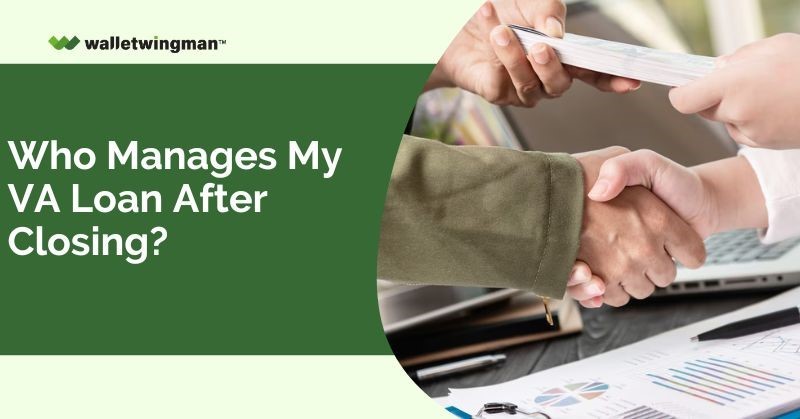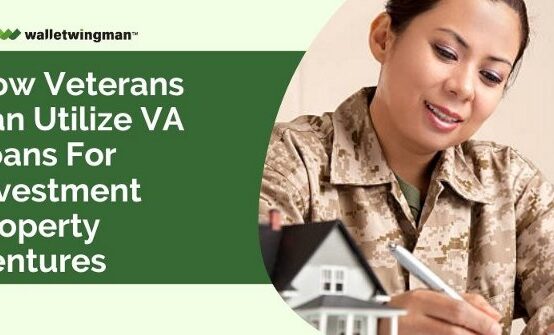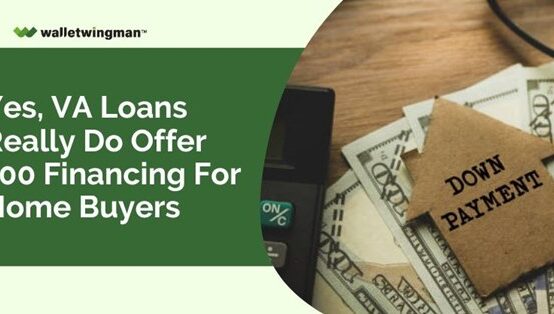Military members and veterans who use VA home loans have questions about what happens to their loans after closing. One of the most common questions has to do with something known as “loan servicing.”
The big question: Who manages my VA loan after closing?
The answer will depend on your mortgage lender’s business model, among other factors. Some lenders transfer servicing responsibilities to a third-party company known as a loan servicer, while others might keep them in-house. By the way, you’ll be informed about this.
Either way, you should receive information about who is managing your VA loan and how to reach them.

Benefits of VA Loans
VA loans offer numerous advantages to eligible veterans and active-duty service members, making homeownership more accessible and affordable. Here are some key benefits.
For those who qualify, VA loans provide unmatched advantages. Most significantly, they do away with the requirement for a down payment, which is a significant obstacle to becoming a homeowner. With the help of this provision, veterans and active military personnel may obtain financing without having to make sizable upfront savings.
Moreover, because VA loans are guaranteed by the Department of Veterans Affairs, they have competitive interest rates and advantageous conditions that lower the risk for lenders. Because of this, borrowers are frequently able to obtain cheaper interest rates, which, over the course of the loan, yield considerable savings.
Further relieving the financial load on borrowers and increasing the accessibility of homeownership for veterans of the nation are the low closing fees associated with VA loans.
By eliminating the need for a down payment, offering competitive interest rates, and limiting closing costs, VA loans empower veterans and active-duty service members to accomplish their homeownership goals with greater ease and financial flexibility.
Now that we’ve highlighted the benefits of VA loans, let’s delve into what happens after closing.
What Happens to Your VA Loan After Closing
This will all make more sense if we put it into a broader context. While the VA loan process can vary from one mortgage company to the next, it usually looks something like this:
1. Loan Origination: Mortgage loan origination marks the start of the procedure. Realizing the benefits of a VA mortgage loan, a borrower files for a VA loan via a lender that has been approved. To establish eligibility and authorize the loan, the lender considers the borrower’s credit history, financial information, and property specifics.
2. VA Loan Occupancy Requirements: It is essential for borrowers to be aware of VA loan occupancy requirements. According to these criteria, borrowers should use the purchased home as their principal place of abode. Following these guidelines helps borrowers make wise decisions throughout the loan process and guarantees the integrity of the VA loan program.
3. Closing and Funding: Following approval of the VA loan, the borrower goes through loan funding and closing, where the last paperwork is signed. At this point, the borrower gets the money needed to buy the house or pay down an existing mortgage.
4. Loan Sale: The lender has the option to sell the mortgage loan to a different party after closing, which might be a private investor, a government-sponsored enterprise (GSE) like Freddie Mac or Fannie Mae, or a mortgage aggregator. Several variables, including market circumstances, risk management tactics, and liquidity requirements, may influence the choice to sell loans.
5. Pooling and Securitization: In some cases, lenders package multiple mortgage loans together and sell them as mortgage-backed securities (MBS) to investors. This process, known as securitization, allows lenders to transfer the risk associated with mortgage loans to investors while generating additional liquidity to fund new loans.
6. Transfer of Servicing Rights: When a VA loan is sold to a new owner or investor, the servicing rights associated with it can be transferred to a loan servicer. The servicer is responsible for handling the loan on behalf of the new owner or investor, including collecting payments, processing escrow transactions, and providing customer service to borrowers.
7. Notification to Borrowers: Borrowers are typically notified when their VA loan servicing and management is transferred to a new servicer. They’ll normally receive a welcome letter or notice informing them of the transfer and providing instructions for making payments. This notification may also include essential details such as their VA loan certificate of eligibility, ensuring borrowers are aware of their entitlement to VA loan benefits throughout the servicing transfer process.

The VA Loan Certificate of Eligibility
Verifying a borrower’s eligibility for VA loan benefits requires a certificate of eligibility for VA loans, which is an indispensable document. It serves as proof that the applicant is qualified for a VA home loan and meets all requirements outlined by the Department of Veterans Affairs (VA).
To receive a VA loan certificate of eligibility, veterans, active serving military people, and some members of the National Guard and Reserve must submit papers to the VA along with proof of military service or other qualifying conditions. Further documentation, such as VA minimum property requirements, may be needed by lenders to verify compliance with VA regulations.
This certificate not only shows that the applicant is eligible for a VA loan, but it also provides essential information about the borrower’s entitlement amount—that is, the maximum loan amount that can be granted without a down payment.
Additionally, it outlines any entitlement to VA loans that persists after the borrower has previously used VA loans. At the time of loan origination, lenders sometimes require applicants to present their certificate of eligibility for a VA loan in order to ensure compliance with VA standards and expedite the approval of their application. In the end, the VA loan certificate of eligibility is absolutely necessary for qualifying veterans and military members to get VA loan money.

The VA’s Role in All of This
The U.S. Department of Veterans Affairs backs or guarantees veteran home loan. This gives mortgage lenders an added layer of protection against default.
However, the VA doesn’t actually service home loans or collect payments from borrowers. As with conventional mortgages, servicing is typically handled by private mortgage companies known as loan servicers.
As it states on the Department of Veterans Affairs website:
“The Department of Veterans Affairs (VA) defines a servicer as a mortgage company that collects funds for a debt incurred by a borrower to purchase a home. Servicers play a critical role in the VA Home Loan Program, as many essential loan management activities are delegated to them.”
By guaranteeing a portion of the loan, the VA also does the following:
- Protects Lenders: The government backing minimizes the lender’s risk, encouraging them to offer favorable terms to veterans.
- Benefits Borrowers: This program offers easier qualification, no down payment requirements, and competitive interest rates for veterans and eligible service members.

A Closer Look at What Servicers Do
Finally, let’s look at what loan servicers do when it comes to managing VA loans after the closing and funding have occurred. While the exact services performed can vary, VA loan servicers usually handle the following management tasks:
- Payment Collection: The loan servicer’s primary duty is collecting monthly mortgage payments from borrowers. Payment methods include Automated Clearing House (ACH), online bill pay, the servicer’s website or app, or traditional mail. This ensures borrowers have convenient options to fulfill their financial obligations, facilitating smooth transactions and timely payments to maintain loan agreements.
- Payment Distribution: After receiving payments, the servicer allocates them among various entities, including the loan investor, property tax authorities, and insurance companies, if an escrow account exists. This process ensures that all financial obligations such as premiums, taxes and insurance which are associated with the mortgage, are met promptly and accurately, safeguarding the borrower’s interests and maintaining the loan’s integrity.
- Record Keeping: The loan servicer diligently maintains comprehensive records of payments, balances, and loan history on behalf of borrowers. This meticulous record-keeping ensures transparency and accountability throughout the loan servicing process. By managing these essential financial documents, the servicer facilitates accurate tracking of payment histories, balances owed, and any pertinent loan-related activities, fostering trust and compliance with regulatory requirements.
- Customer Support: Loan servicers serve as the primary point of contact for borrowers, addressing inquiries related to their loans. Whether seeking payoff amounts or resolving billing discrepancies, borrowers can rely on servicers for assistance. Typically, borrowers receive servicer contact information upon loan transfer, ensuring accessibility for resolving any concerns or inquiries that may arise throughout the loan term.
- Delinquency Management: In cases of payment delinquency, the servicer collaborates with borrowers to assess the situation and devise strategies to restore loan status. By prioritizing resolution over foreclosure, servicers offer alternatives such as loan modification or repayment plans. Mitigating foreclosure risks benefits both parties, emphasizing the servicer’s commitment to assisting borrowers in overcoming financial challenges while preserving homeownership.
As mentioned above, loan servicers can play an essential role in preventing foreclosures. This is true for conventional, FHA, and VA loans alike. According to the Urban Institute:
“If homeowners fall behind on their payments, the servicer’s role is to work with the homeowner and help them get back on track. If that is not possible, the servicer pursues a loan modification (if the homeowner is eligible) or explores an alternative to foreclosure, such as a short sale or deed in lieu of foreclosure.”
Now you know what happens to your VA loan and who manages it after the closing!


 How Veterans Can Utilize VA Loans For Investment Property Ventures
How Veterans Can Utilize VA Loans For Investment Property Ventures  Does VA Actually Give You Money to Buy House?
Does VA Actually Give You Money to Buy House?  Yes, VA Loans Really Do Offer 100% Financing for Home Buyers
Yes, VA Loans Really Do Offer 100% Financing for Home Buyers  How to Use Discount Points to Lower the Rate on Your VA Loan
How to Use Discount Points to Lower the Rate on Your VA Loan 